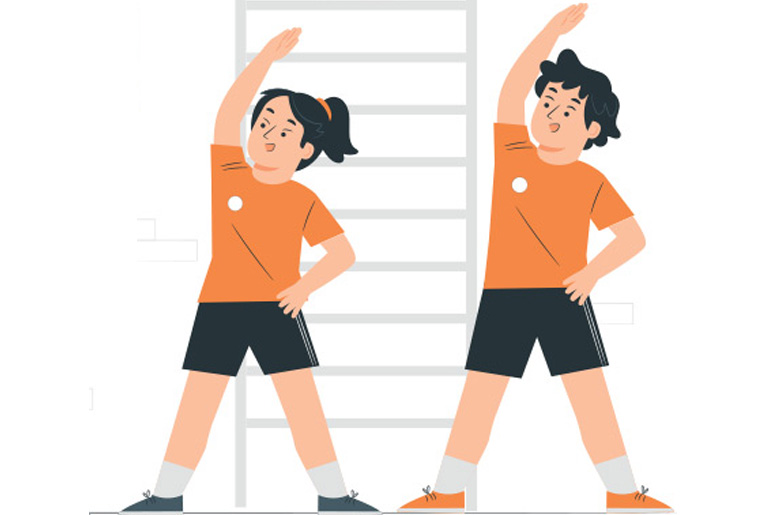Emerging research highlights the significant mental health benefits of exercise for children, showing that staying active can play a crucial role in safeguarding and enhancing young people’s wellbeing. As the global rates of mental illnesses in adolescents rise, with one in seven affected, physical fitness is increasingly being recognized as a key preventive measure. Studies indicate that even small improvements in fitness can have a profound impact on mental health, reducing the risk of conditions like anxiety, depression, and ADHD. A recent study showed that just a 30-second improvement on a running test resulted in a 7-8% reduction in the likelihood of developing these conditions. This suggests that incorporating regular physical activity into children’s routines could be a simple yet effective strategy for boosting mental health.
The Positive Impact of Team Sports:
Team sports, in particular, have been found to offer unique benefits for adolescent mental health. Research involving more than 17,000 teenagers revealed that those who participated in sports clubs were 60% less likely to experience depression compared to inactive peers. The combination of physical activity, social connection, and structured routines provided by team sports creates an environment conducive to improving mental wellbeing. These activities not only promote fitness but also foster a sense of belonging, teamwork, and social support, which are essential components for mental health.
Academic Performance and Cognitive Benefits:
Exercise also has cognitive benefits, enhancing children’s academic performance. Physical activity has been shown to improve concentration, decision-making, attention, and overall academic performance, including skills in maths and reading. Even short bursts of activity, such as ten-minute sessions, can have immediate positive effects on classroom performance. Given this, experts suggest that increasing physical activity during the school day—rather than cutting it in favor of more academic subjects—can improve both students’ mental wellbeing and their educational outcomes.
Recommendations for Introducing Physical Activity:
Experts agree that it is never too early to encourage children to engage in physical activity. The World Health Organization (WHO) recommends that children aged 3-4 engage in at least 180 minutes of physical activity daily, including 60 minutes of moderate to vigorous exercise. For school-aged children (5-17 years), the recommendation is 60 minutes of physical activity daily, with activities that strengthen muscles and bones at least three times a week. The key to fostering a love for movement is to make the activities fun and age-appropriate. This can be achieved by incorporating play for younger children, exposing them to a variety of sports and activities, and leading by example as parents and caregivers.
Strategies to Encourage Physical Activity:
To successfully encourage children to be more active, experts suggest several strategies:
- Incorporate Play: For younger children, focus on active play such as tag, hide-and-seek, or obstacle courses, which can be both fun and physically demanding.
- Explore Various Activities: Introduce children to a range of sports and activities to help them find what they enjoy. This can include dance, swimming, or martial arts.
- Lead by Example: Children are more likely to adopt active habits if they see their parents participating in physical activity.
- Make It a Family Affair: Plan family outings like hikes, bike rides, or visits to the park to encourage fitness in a fun and engaging way.
- Limit Screen Time: Encourage outdoor play as an alternative to sedentary activities like watching TV or playing video games.
Safety Considerations and Potential Risks
While physical activity is essential for children’s health, it’s important to approach it safely. Potential risks include overexertion, heat-related illnesses, improper technique, and burnout. To mitigate these risks:
- Encourage a variety of physical activities to prevent overuse injuries and ensure adequate rest during training.
- Emphasize hydration and schedule activities during cooler times of the day to prevent heat exhaustion.
- Provide proper instruction and use age-appropriate equipment to avoid injuries.
Balance structured exercise with free play to prevent burnout and maintain long-term interest in physical activity.
A Lifelong Love for Movement
The evidence is clear: physical activity is crucial for both the mental and physical health of children. By introducing fitness early in a fun and engaging way, children are more likely to develop a lifelong love for movement, which will not only boost their mood and mental wellbeing but also support their academic and physical development. Ensuring that children have opportunities to be active is essential for setting them on a path toward a healthy, happy, and resilient future.
Disclaimer:
The information contained in this article is for educational and informational purposes only and is not intended as a health advice. We would ask you to consult a qualified professional or medical expert to gain additional knowledge before you choose to consume any product or perform any exercise.







